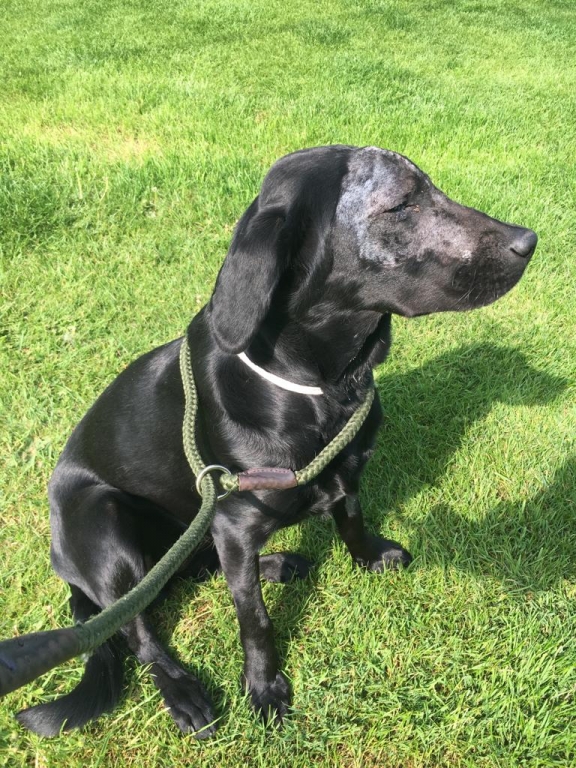
Prompt Diagnosis Saves Labrador From Rare Fungal Infection
A young Labrador has survived a rare fungal infection thanks to a speedy diagnosis, emergency treatment and surgery by neurology and soft tissue Specialists at Davies Veterinary Specialists (Davies), Hertfordshire.
Bridget, an 11-month-old black Labrador caused her owners considerable alarm when her behaviour suddenly changed. She became progressively less responsive to her family, didn’t want to eat and was very lethargic. Bridget was rushed to local vet Louise Collins in Milton Keynes who immediately referred her to Neurology Specialist Alex Forward at Davies for emergency investigations.
An examination followed by an MRI scan revealed marked abnormalities in the right side of Bridget’s nasal cavity and frontal sinus, extending in towards her brain. The infection was particularly severe due to its progression into the brain and Bridget’s rapid deterioration. An emergency MRI scan, sampling and a diagnosis were attained within 24 hours, allowing antifungal medication to be started quickly enough to prevent any further deterioration.
Analysis of a sample of the affected area confirmed Bridget had cryptococcosis, a rare fungal infection. This particular fungus, which is often inhaled through the nose, is present in soil and often spread by birds, especially pigeons. Cryptococcus in dogs is reported less in the UK compared with Australia and the USA, likely due to the different environments and the differing ecological niches of the fungus.
Various methods are used to treat fungal infections of the nose and sinus. Generally, any areas of fungus growth are debrided to remove the fungal plaques and affected tissue in order to allow anti-fungal medications to penetrate into the tissues and be as effective as possible. In some cases, such as with Bridget, the fungus can create what is called a "granuloma" which is a mass of inflammatory tissue and it was necessary to remove this tissue for effective treatment.
Smita Das, Soft Tissue Specialist at Davies performed Bridget’s surgery: “Due to the sheer volume of the granuloma, and the fact that it had eroded the bone towards Bridget’s brain, it was deemed too dangerous to debride it with a less invasive approach such as with camera guidance (rhinoscopy),” explained Smita. “We removed the ‘roof’ of bone over the top of the nose and sinus on the right side in order to see all the structures and debride the abnormal tissue safely. Once the tissues were debrided, the piece of bone was replaced and the rest of the tissues brought together again. The surgery not only helped get Bridget on the road to recovery, but, happily, her lovely face did not seem too altered either!”
Over the next few days Bridget started to improve and slowly became more responsive. Within 11 days she was able to go home – much to her owners’ delight.
“Because of the seriousness of her infection, Bridget will remain on antifungal medications for a long time,” said Alex Forward. “There is a high risk the infection will return if they are stopped too soon. She will be closely monitored over the coming weeks and months to ensure she has the best possible chance of fighting the infection but so far we are very pleased with her response.”
To find out more about Davies and their multi-disciplinary approach to patient care visit: www.vetspecialists.co.uk
More from Davies Veterinary Specialists

 7 years ago
7 years ago  1620 views
1620 views